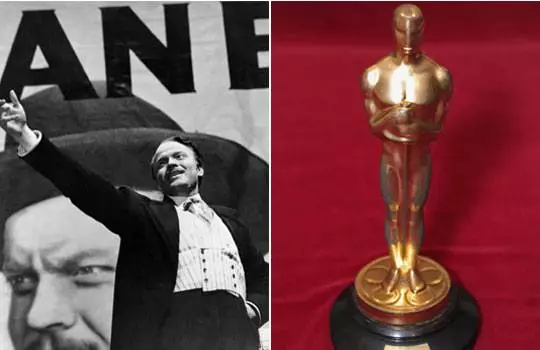Citizen Kane, the 1941 movie directed by Orson Welles, is often hailed as the crown jewel of Hollywood and one of the greatest movies ever made. It received nine Oscar nominations, including Best Picture, Best Director, and Best Actor for Welles. However, it only won one award for Original Screenplay, which Welles shared with Herman Mankiewicz. This single victory in the midst of multiple nominations made this Oscar win particularly significant in the history of film.
In a recent Heritage Auctioneers event called “Hollywood Entertainment,” several items related to the career of Orson Welles were up for sale, including the 1941 Oscar for Original Screenplay. This Oscar, which had a starting bid of $250,000, eventually sold for a whopping $645,000 (inclusive of buyer’s premium).
However, it is essential to note that this Oscar statuette is not the original one awarded to Welles. In 1988, Welles’ daughter Beatrice requested a replacement from the Academy of Motion Picture Arts and Sciences (AMPAS) because she claimed that she could not find the original statuette among her late father’s belongings. The Academy agreed to her request but imposed a condition that it could not be sold without first offering it back to the Academy for just one dollar. This agreement was implemented after 1950 and did not cover Oscars won before then.
The Intricate Legal Battles
In 1994, the “lost” original Oscar statuette unexpectedly surfaced at a Sothebys auction in London. It was traced back to Gary Graver, a cinematographer who worked on Welles’ unfinished 1974 film, The Other Side of the Wind. Graver claimed that Welles had given him the Oscar as payment for his work. Graver sold the statuette for $50,000 to a company that eventually auctioned it at Sotheby’s with a reserve price of $250,000, coincidentally the same as the replacement Oscar. Beatrice Welles, after being notified by Sotheby’s, sued to claim the Oscar. The court ruled in her favor, acknowledging that the statuette was not given as “payment” but rather as a gift. The Oscar was handed over to Beatrice Welles, who later attempted to sell it since she was forbidden by AMPAS from selling the 1988 replacement.
Enter the Academy of Motion Picture Arts and Sciences. Seeing the historic attempted sale of a legacy Oscar, the Academy’s legal team sought to stop the auction of the original statuette. They argued that the 1988 replacement agreement signed by Beatrice Welles would also apply to the original. However, a judge ruled in favor of Beatrice, asserting that she was not the original recipient of the 1941 award, which had been given to her father. She sold the original Oscar for an undisclosed sum, and subsequent buyers attempted to auction it off without success. Finally, in 2011, it was sold for an astounding $871,542.
The Mysterious Selling of the Replacement Oscar
The recent Heritage Auctioneers event raised another perplexing question. The replacement Citizen Kane Oscar was listed without any specific information about the seller or consignor. It only mentioned that it would come with a Certificate of Authenticity. Heritage Auctioneers guarantees that all consignors are legally able to sell their items, adhering to the rules set by AMPAS. However, the identity of the current seller remains unknown. It raises the question of whether Beatrice Welles privately gave or sold the replacement Oscar to someone else, away from public scrutiny. This creates an intriguing situation since the seller and the buyer would also be subject to the same agreement that Beatrice signed in 1988 with the Academy.
The Continuing Saga
The plot thickens as the winning bidder of the replacement Oscar, sold for $645,000, is already attempting to sell it through Heritage Auctioneers for $967,000 or even more. This resale is taking place even before the initial buyer has paid for the item or it has been shipped by Heritage.
Additionally, another Oscar statuette, attributed to Citizen Kane but without a nameplate, was auctioned with a starting bid of $15,000 and sold for $21,250. It is also now available for immediate resale with an asking price of $31,875.
Conclusion: A Complex Odyssey
In the convoluted journey of Citizen Kane’s Oscars, it becomes evident that the sale and possession of these prestigious awards can be subject to legal battles and intricate agreements. The legacy left by Orson Welles, his daughter Beatrice, and the Academy of Motion Picture Arts and Sciences remains intertwined and unresolved.
The current actions of the sellers and buyers involved in the auctions raise critical questions about the integrity of the agreements made between AMPAS and award recipients. As the Academy looks into this situation, the fate of these Oscars hangs in the balance, leaving fans of Citizen Kane and film history eagerly awaiting the resolution of this complex saga.

